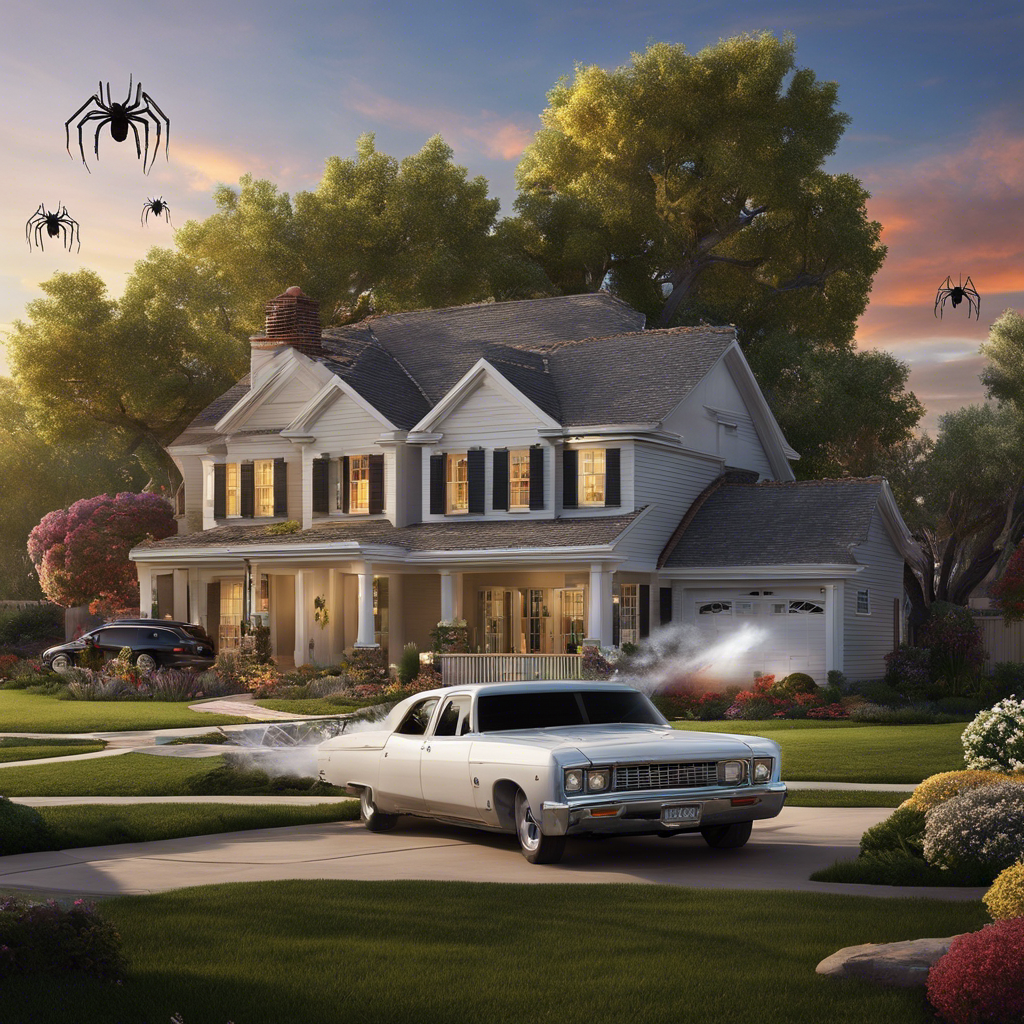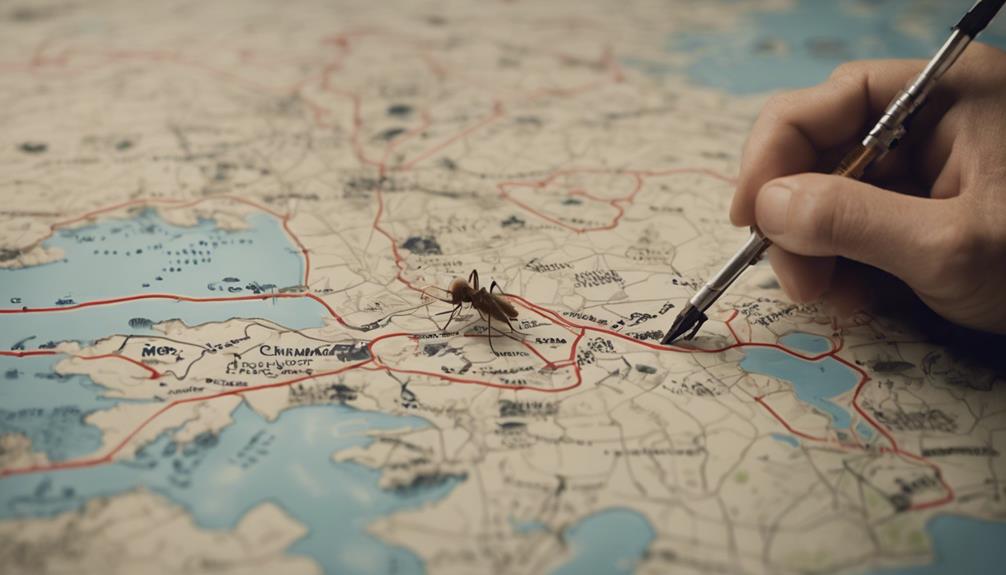In the days of yore, battling spiders in your St. George home might’ve involved little more than a rolled-up newspaper, but today, you’re up against a much trickier foe. You’re likely making critical errors in your spider control efforts without even realizing it.
From overusing chemical repellents to ignoring the tiny cracks that serve as their doorways into your abode, these mistakes can turn your home into a haven for these eight-legged guests. But there’s more to the story, and understanding the full spectrum of missteps can arm you with the knowledge to keep your home spider-free.
Key Takeaways
- Avoid overusing chemical repellents to prevent harm to the environment and health risks.
- Seal cracks and gaps to cut off spiders’ main entry routes into homes.
- Use dehumidifiers and ensure proper ventilation to control humidity and deter spiders.
- Regularly clean homes to disrupt spiders’ hiding spots and prevent infestations.
Overusing Chemical Repellents
Overusing chemical repellents not only harms the environment and beneficial insects but also risks human and pet health in your St. George home. When you’re battling spider infestations, it’s tempting to go all out with chemical solutions. However, this approach can backfire.
Excessive reliance on these repellents can lead spiders to develop resistance, making your pest control efforts less effective over time. Moreover, incorrect application poses direct health risks to your family and pets. It’s essential to remember that overusing these chemicals won’t provide a lasting solution to spider problems.
Instead, you’re likely to face ongoing challenges as these pests adapt. Embrace smarter, more sustainable strategies for pest control that safeguard your home without compromising the well-being of its inhabitants.
Ignoring Entry Points
While addressing the overuse of chemical repellents, it’s equally important to focus on another significant aspect of spider control: ensuring your home is sealed against their entry.
Spiders can sneak in through tiny cracks, gaps around doors, windows, and screens. Ignoring these entry points can lead to continued spider infestations, making it vital to regularly inspect and seal these areas. Overlooking these potential entrances can result in recurring spider problems, frustrating homeowners.
Addressing entry points is a key step in preventing spiders from entering your home. By inspecting and sealing these vulnerabilities, you’re not just solving a problem temporarily; you’re taking a proactive approach to keep your home spider-free. Remember, sealing entry points effectively cuts off one of the main routes spiders use to invade your space.
Overlooking Humidity Control
Turning a blind eye to humidity control in your home can inadvertently roll out the welcome mat for spiders. They are drawn to moist environments, and high humidity levels not only attract these unwelcome guests but also encourage their activity and reproduction, escalating spider infestations in your living spaces.
Installing dehumidifiers is a key step towards reducing moisture and deterring spiders. Additionally, ensuring proper ventilation contributes greatly to moisture control, laying the groundwork for an unwelcoming environment for spiders.
Regularly monitoring and adjusting humidity levels in your St. George home is essential. It’s not just about comfort; it’s about safeguarding your sanctuary against spider invasions. Embrace humidity control as your ally in maintaining a spider-free home.
Neglecting Regular Cleaning
Neglecting regular cleaning in your St. George home creates a welcoming environment for spiders, allowing them to hide, reproduce, and thrive undisturbed. By skipping dusting and vacuuming, especially in corners, ceilings, and behind furniture, you’re basically rolling out the red carpet for spider populations to multiply. Remember, cluttered and dusty areas are prime real estate for these eight-legged guests.
To combat this, adopting consistent cleaning routines is essential. Regular cleaning not only disrupts potential hiding spots but also removes webs, eggs, and reduces the chances of an infestation. By keeping your home tidy and free of clutter, you’re taking a vital step in preventing spiders from making themselves at home. Don’t let neglect put your space at risk.
Misidentifying Spider Species
Misidentifying the species of a spider in your St. George home can lead to ineffective and possibly harmful control efforts. Confusing venomous spider species like Black Widows with less harmful ones can result in inadequate treatment measures. Likewise, mistaking harmless spider species for dangerous ones can cause unnecessary panic and ineffective control strategies.
It’s critical to differentiate between Jumping Spiders and Brown Recluse spiders for appropriate management. Thinking Wolf Spiders are Brown Recluse can spark undue fear and overreaction. Recognizing the correct spider species is essential for implementing targeted and efficient control methods.
Frequently Asked Questions
What Do Spiders Hate the Most?
Spiders detest strong scents, with peppermint and citrus leading as natural deterrents. Contrary to spider myths, these solutions are effective. You’ll find peppermint’s effectiveness and citrus solutions essential for making your space unwelcoming to them.
What Keeps Spiders Out of Your House?
To keep spiders out of your house, focus on sealing entryways, regular cleaning, reducing moisture, and adjusting outdoor lighting. These steps create an unwelcoming environment for spiders, ensuring your home stays spider-free.
What Do You Spray Around Your House for Spiders?
To keep spiders at bay, imagine your home as a fortress. You’ll want to use chemical treatments with active ingredients like bifenthrin, while also considering natural repellents. Always prioritize safety precautions and proper spider identification.
What Kills Common House Spiders?
To kill common house spiders, consider their diets, natural predators, life cycle, and seasonal behaviors. Use insecticides, vacuuming, natural remedies like essential oils, and sticky traps. Keeping your space clean reduces their hiding spots.




